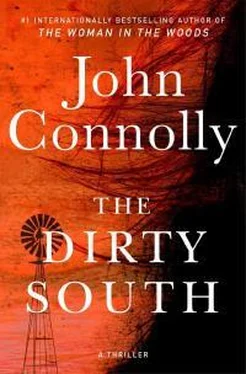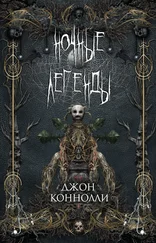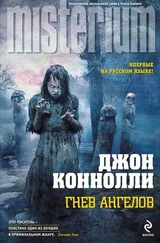‘Can I tell them why?’
‘Inform them that Jurel Cade just declared war.’
‘On us?’
‘On everyone.’
Ivy Muntz unlocked the rear door of the Rhine Heart, and Kel Knight called out Denny’s name. He received no reply, but could hear the radio playing from somewhere in back.
‘Should I come with you?’ said Muntz.
‘No, you stay here. Anyone else arrives, you make sure they remain outside.’
The hairs on Knight’s neck were standing on end, and he had a cramp in his stomach. A man just grew to know when something wasn’t right. He unclipped his holster, but didn’t draw his weapon. He entered the private precincts of the Rhine Heart, containing the storage areas, the kitchen, and Denny Rhinehart’s small, windowless office. That was where he found Rhinehart lying on his back with a new hole in his face, another in his belly, and the room stinking of blood and death. Knight checked for a pulse, but only so he could later attest that he’d done everything right. Rhinehart’s skin was cold and rigor mortis had already set in.
Knight had never liked Denny Rhinehart because he’d never trusted him, and Knight could never like someone who couldn’t be trusted. But now, looking down on Rhinehart’s remains, he lowered his head briefly to pray for the man’s soul before stepping outside to call Evan Griffin.
Reverend Nathan Pettle lived in a two-story dwelling painted yellow and green, with a small Stars and Stripes fluttering from a flagpole above the front door. A white Country Squire station wagon bearing the ichthys symbol alongside a Clinton/Gore bumper sticker was parked in the drive.
Parker pulled up alongside the station wagon, stepped into the yard, and rang the doorbell. After a short wait, the door was opened by a tall, gray-haired man wearing a clean but untucked white shirt and a pair of bargain-store jeans. His face bore the dazed look of someone who had just been woken from sleep, and his feet were bare.
‘Reverend Pettle?’ said Parker.
‘Yes, can I help you?’
Parker identified himself and displayed him the temporary ID issued by the Cargill PD. Pettle took it in his hand and examined it closely, squinting.
‘I don’t have my glasses,’ he said.
‘They’re hanging from your shirt.’
Pettle dabbed at his chest, found the glasses, and put them on.
‘You’re the policeman from New York.’
‘Ex,’ said Parker, ‘although I suppose that piece of paper makes me current again.’
Pettle handed it back to him.
‘What can I do for you?’
‘I’d like to talk to you about the Cade family, and Hollis Ward.’
Parker saw Pettle’s face relax slightly, almost in relief, before it settled into a confused scowl.
‘Why Hollis Ward?’ he said.
‘Perhaps we could discuss it inside.’
‘This really isn’t a good time.’
‘Reverend, I know you helped identify Donna Lee Kernigan’s body. You saw what was done to her. We’re trying to stop that from happening to any other young women.’
Pettle looked at his watch.
‘I’m expecting my wife home shortly.’
‘Is that a problem?’
‘We’re obligated to have an important family discussion.’
‘I’m sure you can delay it.’
Parker’s tone brooked no further argument, so Pettle conceded defeat.
‘I guess you’d better come in, then,’ he said.
He stepped aside to admit Parker.
‘After you,’ said Parker, and waited for Pettle to lead the way.
Because Kel Knight wasn’t the only one who could sense when something was wrong.
Evan Griffin was staring at the body of Denny Rhinehart. Griffin had no personal experience of investigating professional hits, but this didn’t strike him as a murder of that stripe. From the mess on the carpet, and the blood on the papers, he got the impression that Rhinehart might have rolled around some as he died, which meant he’d probably also been making a degree of noise, because Griffin didn’t believe that men wounded in the belly elected to suffer quietly. For that reason, no professional would opt to kill a man by shooting him in the stomach, which meant that a second shot had been required to finish Rhinehart off. There weren’t many good ways to die, but this wasn’t one of them. Griffin also spotted what looked like a bullet hole in the carpet close to Rhinehart’s body. He deduced that the killer had fired at least one other shot, which missed its target, before the fatal bullet struck Rhinehart, lending further support to Griffin’s theory that this was the work of an amateur.
Like Knight, Griffin never had much regard for Rhinehart, but he hadn’t deserved such an end. No one could merit that kind of violence, not even the man currently responsible for the deaths of two – or possibly three – young women in the county. Griffin wanted that individual tried in a court of law, judged by a jury of his peers and, if found guilty, given the needle. Should Bill Tindle truly have witnessed the aftermath of some altercation between Rhinehart and Donna Lee Kernigan, one that subsequently led to Donna Lee’s death at Rhinehart’s hand, then the latter’s murder had deprived the state of its right to justice. Griffin wasn’t jumping to any conclusions, but Cargill was a small town. Despite recent evidence to the contrary, homicide was an aberration here, and Denny Rhinehart, as Sallie Kernigan’s former employer, had enjoyed a relationship with the Kernigan family.
‘Does he have a safe?’ he asked Knight.
‘Nope. According to Ivy, Rhinehart kept a cash box in the bottom drawer of the file cabinet. He didn’t like holding large sums on the premises, but it wasn’t as though the bar was doing so well that this was often an issue, so he’d sometimes let a couple of days go by before he made a run to the bank. The cash box is still in the cabinet and it hasn’t been touched. The cabinet was unlocked and, from what I can tell, the place hasn’t been tossed.’
Papers covered the floor, but the majority were stained with the emissions of Rhinehart’s dying, which most likely meant that he’d knocked the documents from the desk as he fell. His chair was still upright, but was pushed back against the wall. The drawers in the desk were all closed. Griffin opened them with a gloved hand, revealing only assorted items of stationery, a couple of bags of candy, and a selection of pornographic magazines. He flicked through the titles, noting that they catered exclusively to the barely legal market: the models were probably all over eighteen, but had been chosen because they looked much younger. Many were black. He put the magazines back where he’d found them.
‘It’s time to hand this whole mess over to the state police,’ he told Knight. ‘This is getting out of hand.’
‘Won’t make Jurel Cade like us any more than he already does.’ Knight had been about to call in the discovery of Rhinehart’s body when Billie came on the radio to tell him that Griffin wanted to see him, because Jurel Cade was on the warpath.
‘Can’t increase his dislike for us either,’ said Griffin. ‘Besides, he has his own agenda. He now knows about Hollis Ward’s fingerprint on the body, and that Tilon Ward was seen with Donna Lee shortly before she died. He tried to tear me a new one for letting Tilon – and I quote – “slip through our fingers.” He said he’d find Tilon and the old man himself.’
‘Does he believe they’re in it together?’
‘It’s never plain what Jurel believes about any given situation,’ said Griffin. ‘If he has resolute principles, I’ve yet to determine what they might be.’
He heard footsteps approaching from the bar. Seconds later, Tucker McKenzie, the forensic analyst, appeared at the door, already suited and booted, with Colson beside him. It was the first time Colson had seen the body. She winced, but didn’t otherwise react. Griffin didn’t feel he had a lot about which to congratulate himself, especially lately, but hiring Colson had been one of his better decisions.
Читать дальше












